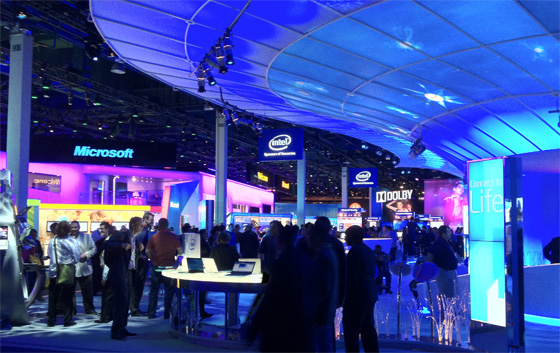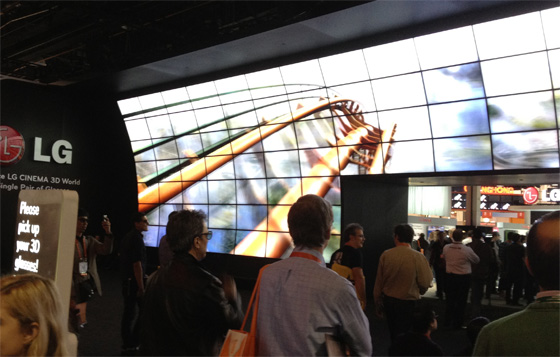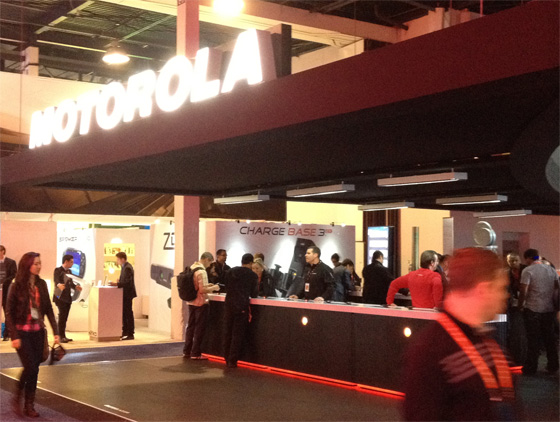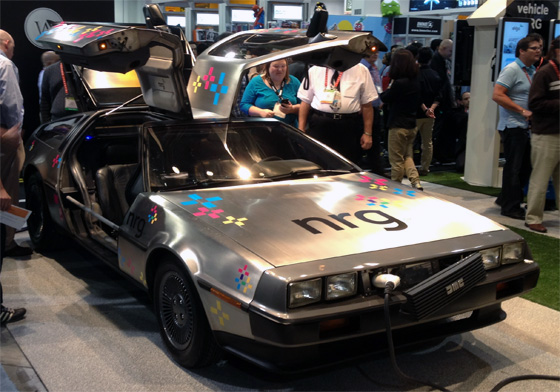The first few days of Tecmark’s visit to CES 2012 in Las Vegas have been amazing. We’ve tested some great new technology including the latest mobile phones, 3D TVs, smart home appliances and robotics. We’ve heard great keynote speeches from Microsoft CEO Steve Ballmer, Intel President Paul Otellini and Paul Jacobs, Chairman of Qualcomm. We’ve also been lucky to sit in on some more intimate discussions about the future of the technology ecosystem with Google’s Eric Schmidt and Tim Baxter from Samsung, as well as a great discussion about the future of mobile with an interesting panel including Heroes actor Greg Grunberg, Samsung’s Esteban Contreras and photographer Chase Jarvis amongst others.

CES 2012: LVCC North Hall – one small section of the 20+ exhibition areas across Las Vegas this year
3DTVs at CES
One of the most impressive demonstrations of new technology at CES 2012 is LG’s range of 3DTVs.
Personally I’ve never been a big fan of 3DTV, but LG’s new 55″ OLED TV has completely changed my view. The clarity of the picture was unbelievably good, and the 3D experience was truly awesome. Several of the people standing next to me actually reached out to grab hold of objects projecting out of the screen, as if they couldn’t believe what they were seeing could be anything but real, physical objects jumping out from the crystal-clear OLED screen.
Nearby LG’s demonstration models of the new 55″ screens was an enormous 3D experience made up of hundreds of screens.

Huge 3DTV Screen at the LG Stand

Huge 3D TV Screen at the LG Stand (2)
Innovative Workstations
An interesting new idea from the Canadian company MWE Lab is a great office workstation comprising of a very comfortable chair combined with ergonomic components to hold a computer, keyboard, mouse and monitor. The whole thing is powered and fully customisable and boasts an integrated Bose sound system. Sitting in the chair felt like being in my own little bubble and I can imagine the focus and concentration this workstation would offer. I think some of the Tecmark developers would kill for one of these.

Kevin testing MWE Lab's Emperor office workstation
Motorola
Motorola made an important announcement during the Intel CEO’s keynote on Tuesday, confirming a multi-year strategic alliance with Intel which means Motorola phones will be making use of the new Intel Atom mobile-optimised CPUs in the near future.
On Motorola’s stand was a selection of their new devices. One of the most impressive was the new Motorola Droid Razr.

Testing the new Motorola Droid Razr at CES 2012
The screen’s clarity was phenomenal and appeared to be easily as good as the retina screen on the iPhone 4. Motorola have also customised the Android OS on their latest devices to include some features unique to Motorola. One of the most impressive new features is called Smart Actions and allows the user to create ‘rules’ to customise the phone’s setup according to changes in the phone’s status or location, for example. One potential use of this system is to have the phone automatically turn off non-critical services such as Bluetooth when the phone’s battery goes below 10%. The user can create any rule they like, giving them total control over the device and enabling the device to become much smarter than the average smartphone. Smart Actions is one example of how manufacturers choosing Android as their OS are differentiating themselves not only from competing platforms such as iOS and Windows Phone, but also from other competing Android platforms. In Motorola’s case, they are trying to stand out from Samsung, HTC and others in the crowded Android marketplace.
Intel have been slow to enter the mobile sector with their processors, but CES 2012 marks their arrival. Their chips appear incredibly fast with powerful graphics capabilities and extremely low battery usage compared to other existing phones using rival processors such as Qualcomm’s Snapdragon CPUs.

Intel demonstrator shows their demo device taking burst of 10 high-quality photos in under 1 second
Intel demonstrated their own ‘reference design’ smartphones and tablets running Android 4.0 (codenamed Ice Cream Sandwich). We put the devices through their paces and they were incredibly slick. Lenovo’s K800 will be the first smartphone to use Intel’s new Atom mobile chip and will be available in China in the next few months. Intel’s partnership with Motorola, which is now part of Google, suggests that the three companies are forming a strong strategic bond designed to compete more effectively with Apple who, despite being absent at CES 2012, clearly remains the benchmark of quality in terms of hardware, software and the ecosystem bringing the user experience together.
Electric Powered Delorean
We’ve seen so much already at CES 2012 that it isn’t possible to cover everything in this one blog post. One final area worth mentioning, though, is the innovation in renewable energy with many solar power and other clean power alternatives being demonstrated this year. Outside of the exhibition halls are solar-powered mobile phone charging stations which came in very handy. NRG, a solar power company, brought an electric-powered Delorean with them to promote their clean energy initiatives.

Electric-powered Delorean at NRG's stand
The Evolution of ‘Smart’
Although discussion of the technology ‘ecosystem’ and the launch of ‘ultra-books’ (slim laptops) have dominated much of the show so far, in my opinion one of the most interesting trends is the possibility for all electronic devices to evolve ‘smart’ capabilities in an always- on, always-connected environment. Some examples at CES include home appliances such as refrigerators and washing machines running the Android OS, giving them the ability to send notifications to their owner’s smartphone. The possibility of every electronic device communicating its status and location to the cloud would save us time and energy, and significantly change the way we live our lives. Although we’re not there yet, this appears to be direction many companies we’ve spoken to at CES are heading. In particular, Google are very strongly positioned to sit at the epicenter of this future world, due to the openness of their Android operating system which can lend itself to much more than just smartphones, as we’ve seen this year at CES 2012.

